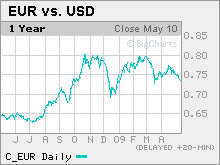Dollar hits a new 4-month low
Optimism on global economy sparks risk appetite. Euro climbs to 7-week high.
NEW YORK (Reuters) -- The U.S. dollar dropped to a four-month low Tuesday as economic data bolstered the view that the global recession is easing and dented safe-haven demand for the greenback.
Stronger-than-expected U.K. retail sales, housing market and industrial production data pushed the British pound up well over 1% versus the dollar, while the euro hit a seven-week high above $1.370.
Investors also took heart from data from China overnight which showed investment spending surged even though exports fell more steeply than expected.
"In general, market participants seem to be subscribing to the 'green shoots of recovery' theory," said Samarjit Shankar, director of global foreign exchange strategy at the Bank of New York Mellon in Boston. "If risk appetite remains in place, the dollar is likely to continue to weaken."
In mid-morning trading in New York, the ICE Futures U.S. dollar index, which tracks the greenback against a basket of six currencies, fell 0.6% on the day, having hit 81.998, the lowest since early January.
The dollar index is on track for its third consecutive close below the 200-day moving average after breaking below longer-term technical support on Friday. The 200-day moving average now becomes technical resistance.
The euro rose to a seven-week high of $1.3706, according to Reuters data. It was last up 0.5% at $1.3643, extending gains after news the U.S. trade gap widened less than expected in March boosted risk appetite.
The euro is firmly on track for a third daily close above the 200-day moving average and second straight week above the 200-week moving average.
Against the yen, the euro erased earlier gains to trade 0.4% lower at 131.81 yen and the dollar fell 0.9% to 96.62 yen after sliding to 96.53 yen, the lowest since late April.
Kathy Lien, director of currency research at GFT Forex in New York, attributed the selloff in dollar/yen to broad-based pressure on the greenback and currency hedging by Japanese exporters. She said the dollar/yen pair is also approaching key technical levels.
European Central Bank President Jean-Claude Trichet said on Monday the global economy is at an "inflection point" and could turn the corner soon.
The improvement in risk appetite also benefited the higher-yielding Australian and New Zealand dollars.
The Australian dollar was up 0.9% at $0.7647 while the New Zealand dollar gained 0.8% to $0.6058. ![]()


